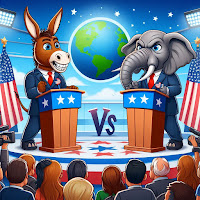The role-playing game in politics
"We got a fight ahead of us, and we are the underdogs in this race": this is what Harris declared at a fundraising event in July.
Yet, these words come from the sitting Vice President, who has also served as California’s Attorney General and Senator - hardly an insurgent outsider.
Interestingly, in 2016, it was her current opponent, Donald Trump, who played the underdog role and was perceived as such: a wealthy, famous businessman up against the political establishment, financial elites, and the media.
The outsider role is easier than you'd think
Since then, Trump has frequently described himself as a victim of the system: "harassed, investigated, defamed, slandered, and persecuted like no elected leader in American history."
If you're Italian, this might sound familiar.
For years, former Prime Minister Silvio Berlusconi, despite wielding an unusual mix of political, economic, and media power, portrayed himself as an outsider persecuted by the media, judiciary, political opponents, and others.
But Harris, Trump, and Berlusconi are in good, global company.
For a more recent example, we can look at the latest British election campaign, where both Keir Starmer and Rishi Sunak used their families’ humble, hardworking backgrounds as a rhetorical tool - even though they are both currently privileged.
When things go wrong, it's always someone else's fault
Although it doesn't hold up logically, this kind of rhetoric remains effective, probably because it taps into the anti-system resentment shaking up public opinion in Western countries.
According to Gallup, the percentage of Americans satisfied with the way things are going in the country has been declining steadily for decades.
Elsewhere in the world, things aren't much better.
According to the OECD (the Organization for Economic Cooperation and Development, hardly an anti-system source), trust in the governments of member countries stands at only 39%, while distrust reaches 44%.
There are significant differences between countries and social groups, with women and less-educated people showing greater distrust.
The moral of the story: even when you're part of the system, and at its highest levels, it pays to present yourself as a newcomer, an outsider swooping in to save the day.
It's that easy! The roots of social indignation will always be elsewhere...
An attitude as old as the Bible
The fascination with underdogs is ancient: it goes back at least to the biblical story of David and Goliath, still used today as a metaphor for an unequal fight where the weaker prevails.
In recent times, experimental research has examined this phenomenon.
During the 1980 US election campaign, a study showed that support for Carter increased when respondents were told Reagan was leading in the polls; likewise, support for Reagan grew when respondents were told Carter was ahead.
Even in sports, underdogs (whether real or perceived) attract favor. In a 2007 experiment, a group of US college students was shown a basketball game between two European teams, CSKA Moscow and Maccabi Tel Aviv, and told that one of the teams had lost their last 15 encounters.
Regardless of which team it was, the students overwhelmingly rooted for the one supposedly on a losing streak.
The dislike for winners (especially rich ones)
Several hypotheses have been put forward to explain this phenomenon:
- Dislike or even schadenfreude (taking pleasure in someone else’s misfortune) toward consistent winners, especially when they have significantly more money than their opponents
- A sense of justice toward those with fewer resources: in some experiments, favor for underdogs faded when the underdogs were portrayed as wealthier
- The weight of expectations: some research suggests that joy is greater for an unexpected success than for an expected one, while disappointment is more intense for an unexpected failure than for an expected one. Rooting for underdogs seems wise: if they lose, it’s simply what was expected; but if they win, the surprise is particularly thrilling
- The inspiration we can draw from these stories: if even an underdog can win, it means that, with effort and determination, anyone can succeed
- The lack of personal and material motivations: in a public tender where two companies competed to monitor potentially cancer-causing chemicals in water, the residents of an Idaho town rooted for the more established company, rather than the underdog
We love underdogs, until it affects us
As the author of the last cited study observed, "although rooting for the underdog is pervasive, the effect is a mile wide and an inch deep".
In politics, then, the underdog effect seems like a blunt weapon: we would never support a lovable outsider, if in the end it will be worse for us.


